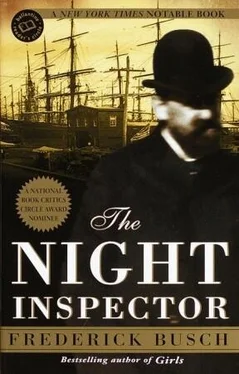But why would a child leave her doll? And why leave but a piece of it?
I assessed the glass, and the scars of bullets in the window’s frame and above the sill. I slowly went to my knees and, seating the lantern on the porch beside the window, I lowered myself to the ground, fully prone, but propped on my hands, so that I could sniff the hard-packed soil of the dooryard. This was something I knew. Then, on my feet again, leaning my rifle against the porch, I walked the wall with the lantern high and close to it, from the doll face along to my right toward the sliding door of a small storage shed. The clapboard was well chewed by gunfire. Most of it seemed to have been concentrated at the same height.
Yes, I thought, slipping the doll’s head into my belt and retrieving my rifle. I thought: No!
I knew to walk out behind the house and to hold my lantern low, to prod the earth with the toe of my boot, looking to pry loose clods. I found nothing for twenty yards in either direction right or left, and nothing fifteen or twenty yards back from the house.
“Well, of course,” I instructed the overgrown field, the high, bright half of moon, the distant trees, the houseful of snoring men. Beyond the light my lantern threw, a creature moved off, and I wished I had gone with it. “Why,” I asked, “would you dig when you hadn’t to? When you were moving at a rapid march?” I should have known, I thought, expert as I was at hiding in sight.
I returned to the house and I pulled a loose finishing nail all the way out of the clapboard with my knife. Using the handle of the knife as a hammer, I affixed the nail above the door of the shed and hung my lantern there. I took up my rifle, though I knew that what I’d face could not be fought, and I slid the shed door open on its rough runner, crying out something in no words, employing the sound as something of a shield.
There was my memory of coiled, sleeping snakes. There was the blood I had smelled on the beaten clay of the dooryard. There was the hamlet, and there— Her arm was bent behind her; she was devoid of expression, although her gray-green blankness was punctuated by the movement of a rat across her mouth (for the flesh is tenderest there, and at the cheeks). I had pulled up and fired before I knew that I would, and of course I missed the rat and caved in the face of the six- or seven-year-old girl, bloated as it was with gases from the corrupted internal organs. Drawn by the sound of my shot, they came up in good time, armed and shouting.
Sam began to convulse in vomiting and tears, and it was contagious, and we all of us were ill. The smell was as nothing compared to what poured upon us from the heaped corpses in their clothing rent by bullet after bullet, and in their blood. Men and women were piled upon each other with no respect for the intimacy of their posture.
I could not help but be offended by this disregard for their modesty, I told Sergeant Grafton.
He looked at me as if he might speak, but then he returned, as did I, to pulling the corpses away from one another and laying them in rows.
Sam whimpered, and then cleared his throat, and made as if to adjust one of the lanterns one of them had hung from a post. “I wish we could know which family was which,” he said. “It seems wrong to separate them like this.”
“A small, a miniature wrong,” the sergeant said.
“Yes. But they require rescuing,” Sam said.
The sergeant only continued to drag the bodies and to line them up.
I was astonished at the number of children they had executed. I wondered if one of the men had shown resistance, or had even killed a Union soldier, to call down such a large and brutal vengeance. All that was ever required, of course, for such a massacre was for a soldier to shoot his piece at the wrong moment, when everyone was tense or fearful or fresh from a battle gone wrong. Of course, it also required an officer, I thought, to permit himself to be swept by the moment’s emotional flood, and to organize the operation. So many men to herd the families, so many men to guard the perimeter as they were marched into place, and so many men to be willing to stand and pour the volley into the mothers huddled round their children or grasping their infants — we’d found three babies — while husbands raged or trembled or called to those they loved about courage or heaven, or threatened the soldiers, or begged. There were young boys and girls, and the babies, and probably the parents had been young, although they now looked very old — as old, I thought, as people get.
The shirts of some were burned at the entrance hole of the bullet. The women, I saw, were clothed, and perhaps they hadn’t been raped. You could not tell, of course, for it’s simple to lift the skirts of her dress up over her head and hold her thus for a comrade before he offers you a similar courtesy so that you may take your turn. I would not look beneath their clothing to see if any had been violated; there were young girls, and I could not bear to know.
Their flesh oozed liquids you would not know the body contained, and the skin was loose on them, as if a form of greenish clothing that might tear away when we moved them. The stench, now fully upon us, was like the fields after any battle, and it merely sickened us, and we were accustomed to such effluvia, so sweet and rich and full of bowel and the cuprousness of blood.
It was their faces I wished not to look upon. I had seen men killed, and I had killed them. I had smelled their corpses and the corpses other men had made. But I’d seen only the faces of men, condemned to die or dying gladly, though I think few do gladly die, and the expressions had, for the most part, been of little more than violence that had shaken the features, which, after days, in fact, begin to relax, go bland and loose and full. Here, however, I saw fury and despair, deep fright, and I sensed in them a diminution — that they had understood, ultimately, that to someone in the world with the power to enforce his conviction, they had not mattered at all.
“You are making something of this,” Sergeant Grafton said. “You are constructing an insight.”
I stood. I regarded him. I thought of striking him, and he knew it.
“Don’t,” he said. “There’s no profit in it.”
I thought of what he deemed an insight, my no doubt erroneous belief that these dead mattered more than any bodies I had produced as I descended upon them like Jehovah down upon the Egyptians. I thought, as well, of the profit and loss in striking the man who could see me summoned at a courts-martial, and who could see me abandoned on a hunt, and who could also, and probably with justification, shoot me down if I made to assault him.
“I haven’t any idea what you mean,” I said, and I commenced the search of dead hands for the fragments of missing, stuffed bits of chest, or arm, or leg, that had been clutched when the volleying had torn away the head and left it perched upon the house. I had vowed that I would investigate each hand of every child, but I could not. I pried open the small fists of one whose eyes were open, and could not force myself beyond the hands of one other, a girl, whose hair had caught fire from the heat of the shots as they entered her face and neck. I took the head of the doll from my belt and carried it to the end of a row and set it upon the straw: man with much of his arm and chest shot away; man with no apparent wound; man with all of one side of his rib cage showing; woman with one shoe on; woman whose wound was in her shoulder, probably dead from the bleeding and shock; small girl; larger girl of seven or so; girl; a boy whose hands remained in fists I dared not open; boy without trousers; girl; the finger of cloth with its painted face.
We slept hard, afterward, each of us claiming not to have wakened to smell his hands or see them as they lay in the shed. I actually went, when I waked, to see if Sam had covered the mirror in the hallway of the house we used. He had.
Читать дальше












